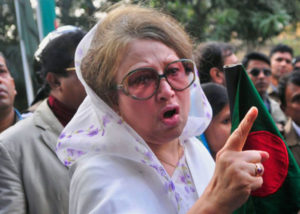By Lekshmi Parameswaran 8/2/2018
Political equations in Bangladesh has taken an intriguing turn with the anti-corruption court in Dhaka convicting opposition leader and former prime minister Khaldea Zia of corruption and sentencing her to five years in jail. The two-time former premier along with her son, Tarique Rahman, who has been sentenced to ten years in prison in the same case were found guilty of siphoning off $252,000, or 21 million taka, in foreign donations meant for the Zia Orphanage Trust. The Bangladesh Nationalist Party (BNP), which Zia leads, has called the termed the verdict politically motivated and is expected to appeal against the verdict.
But for BNP and the democratic milieu of Bangladesh, the verdict has brought with it a certain political uncertainty and has once again raised questions on the increasingly autocratic nature of Prime Minister Sheikh Hasina’s rule. The United Nations and human rights groups across the world have voiced concerns about enforced disappearances and secret detentions in Bangladesh to suppress voices of dissent. In November 2017, Hasina had admitted in Parliament that enforced disappearances are a reality and it is ultimately the government’s responsibility to ensure the safety of citizens.
Now, with general elections fast approaching in December and Haisna and her party, Awami League’s popularity eroding, it is hard not to scrutinize the timing of the verdict. In the 2013 elections, it was the decision of BNP to stay away from the process that gave Hasina an unopposed five-year term. Since then, the political conditions have changed to BNP’s advantage. Though the two-terms that Zia held office was constantly mired in charges of corruption and the allegation that power was in effect in the hands of her son, Rahman, the anti-incumbency factor was expected to work to BNP’s advantage.
Hasina, in doing so, has made a very calculated and calibrated political move that will ensure BNP is left leaderless – till they find an alternate political leader to give the right leadership to the party and its supporters. Inadvertently, Hasina has also ensured that the foreign policy gains that Bangladesh has made with its handling of the Rohingya crisis and cracking down on militants do not get eroded with a change in guard. With all the diplomatic and political strides strongly favouring the Awami League, Bangladesh in all probability is looking at another five years of having Hasina at the helm.
In the begum vs begum battle in Bangladesh politics, Hasina has checkmated – at least for the time being – her inveterate opponent.
(Lekshmi Parameswaran can be contacted at lekshmi.p@spsindia.in)

